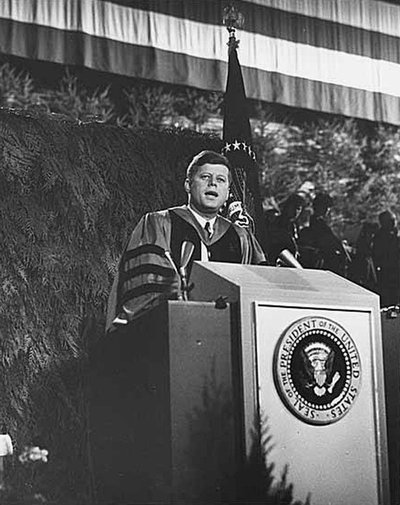October 21, 2010
The UW’s last presidential visit: A different world in 1961
President Barack Obama will speak at the UW today, Thursday, Oct. 21. The last time an incumbent President of the United States visited the UW campus was about a half-century back — a different era in time and tone.
President John F. Kennedy spoke powerfully of America’s place in the world when he addressed the UW’s academic convocation, marking the University’s 100th anniversary, on Nov. 16, 1961, in Hec Edmundson Pavilion.
Cold War tensions were at their height, with the Cuban Missile Crisis just two weeks past. The arms and space races were in high gear, and John Glenn was three months from becoming the first American in orbit. Ray Charles topped the charts with Georgia On My Mind.
“There was quite a bit of excitement at the University — it was a big thing,” recalled Jon Bridgman, professor emeritus of history, who had come to the UW just that summer. “It was a great honor for the University.”
A last-minute route change for security reasons left many standing disappointed along the announced route. A planned stop at the World’s Fair was dropped without notice.
Kennedy was relatively new to the job then, still forming the administration then hopefully dubbed the New Frontier. But as he addressed the hushed crowd of about 11,000, his talk of foreign policy was serious, bordering on solemn.
“We will increase our arms at a heavy cost to make certain that we will never use them,” Kennedy said, according to an article the next day in the Seattle Daily Times. He added that diplomacy and defense are not substitutes for each other. “Either alone would fail. A willingness to resist force, unaccompanied by willingness to talk, could provoke belligerence — while a willingness to talk, unaccompanied by a willingness to resist force, could invite disaster.
“But as long as we know precisely what comprises our long-term goals, we have nothing to fear from negotiations at the appropriate time and nothing to gain by refusing them.”
President Kennedy decried the Cold War extremism of the day, with groups on either side of the political spectrum “far apart in their views yet very much alike in their approach.” He added, “While both extremes profess to be the true realists, neither could be more unrealistic. While both claim to be doing the nation a service, they could do it no greater disservice.”
For the academic occasion, the president wore the academic robe bearing the black and crimson academic colors of Harvard University. It was a brand new one just bought for $200 by mathematics professor Edwin Hewitt, a Harvard classmate and swim team colleague of the young president. “The President is a little taller than I, but the robe fitted him perfectly,” Hewitt told the Times proudly. “So did the cap — 7 3/4. If I never wore that gown again, it would be worth the $200.”
Press coverage struck a respectful note. “There were speeches deep with meaning, both rich in history and filled with challenges for the future,” wrote Don Duncan of the Times. “The robed and colorfully hooded academic figures played their roles against a backdrop of native greenery and a 60-foot Stars and Stripes. Add to this the sight of John F. Kennedy, youthful, handsome President of the United States, marching in the crimson-and-black robes of Harvard.”
Applause greeted his appearance, but the audience did not interrupt the speech itself. “Perhaps the occasion was too serious,” Duncan speculated. “The President even abandoned his own usual chopping motion with his hand as he spoke — delivering his solemn speech in calm, measured tones.”
The hall erupted into a standing ovation when he finished.
Later that day, Kennedy spoke at a festive gathering for then-Sen. Warren G. Magnuson, who was celebrating 25 years in Congress. Though the president’s tone was lighter, reporter Ross Cunningham wrote that “the strain of his responsibilities of his office showed clearly in his face.”
Brewster Denny, dean emeritus of the Evans School of Public Affairs, remembered Kennedy’s UW speech that day as “very good.”
Denny added, “He was very interested in this area, and in the history of this important university.”

